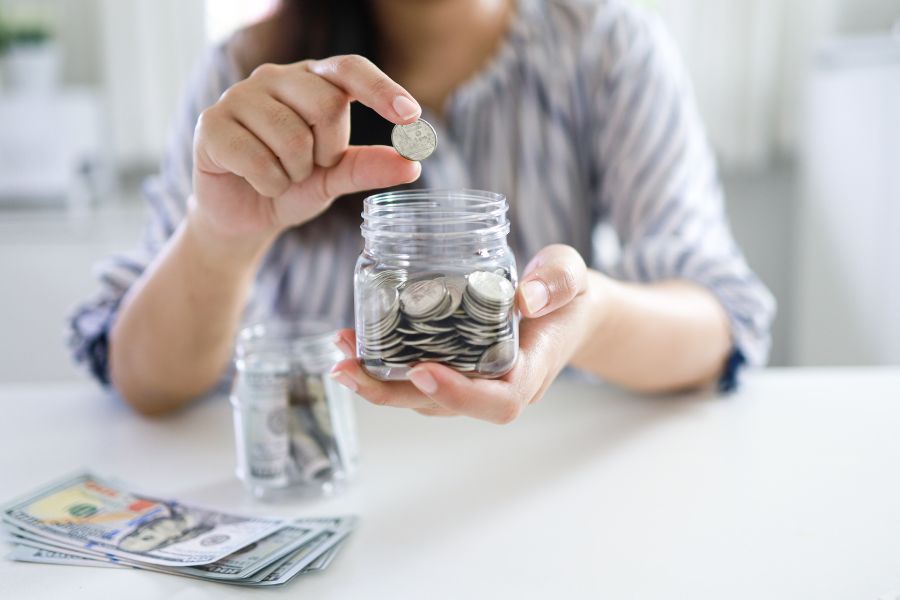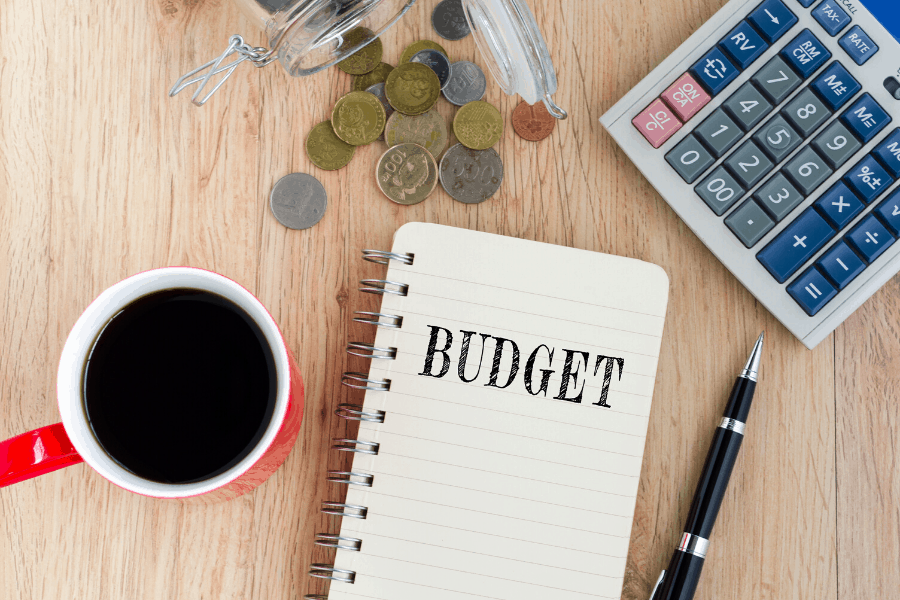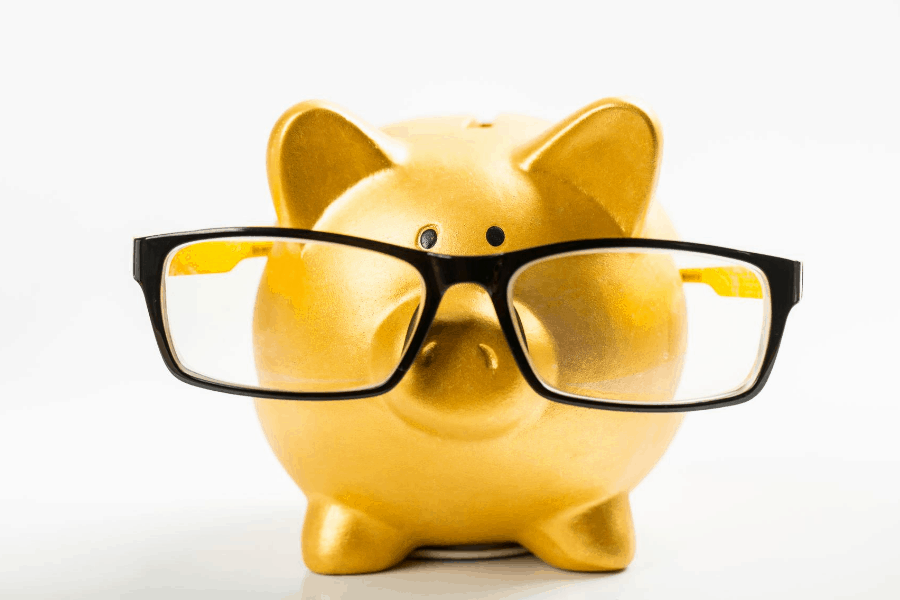Last Updated on November 12, 2022 by Rebecca Lake
Good Money Habits to Grow Wealth
Developing good money habits can be the key to a richer life.
The financial habits you adopt can determine whether you’re able to reach your financial goals.
Bad money habits can leave you in debt and struggling. Good money habits can help you grow wealth and live a financially comfortable life.
There’s more to it than that, of course. But financial habits play a big part in your success story when it comes to money.
I developed some terrible money habits in my 20s. They lead me into a downward spiral of credit card debt and unpaid bills.
It wasn’t pretty. But I was able to sort things out and get my finances on track by adopting some good money habits instead.
And now the credit card bills and student loans are long gone. They’ve been replaced by savings, investments and sweet, sweet financial security.
Sounds good, right?
And I want you to get on the path to financial freedom, too. That’s what we’re all about here after all.
So dive into this post to learn the top good money habits you should be following that can put you on the path to a richer life!
Related post: 52 Week Money Challenge (How to Easily Grow Your Savings in 2022)

LIKE FREE MONEY?
Here are some of my go-to apps for earning extra cash!
Survey Junkie. Earn up to $50 per survey just for sharing your opinions.
Swagbucks. Make money by playing games and watching videos. Join for free and get a $10 bonus when you sign up!
InboxDollars. Take surveys and get paid, no special skills or experience required!
Rakuten. Earn up to 40% cash back at hundreds of retailers, online or in stores. And get $30 for each person you refer, along with a $10 sign up bonus!
CashApp. Need a simple app for sending and receiving money? Get $5 free when you use code ‘VZXRXZN’ to join CashApp.
Why Good Money Habits Matter
Good money habits are important for a number of reasons.
And one of the most important is that they can help you to be financially resilient.
For example, a Key Bank survey found that 49% of Americans became more financially aware as a result of the coronavirus pandemic.
The pandemic prompted people to become more attuned to how they handled their money. And as a result:
- 40% said they were spending less and saving more
- 71% said they’d stopped wasting money on unnecessary items
- 78% said they were more optimistic about their finances
In other words, a financial emergency (whether on a large or small scale) is less worrisome for them now because they focused on developing good money habits.
And there’s another reason to practice better money habits as well. It can help you stress less while achieving your financial goals.
For example, practicing good habits with money can help you:
- Be more intentional with spending
- Stick to a monthly budget plan
- Save more money for emergencies
- Pay off debt
- Find ways to make more money
- Give to causes you believe in
In a nutshell, good money habits can pave the way to financial freedom.
What are some bad money habits?
Before we dig into the good money habits that can make you rich, let’s talk about bad money habits.
A bad money habit is any financial habit that keeps you from getting ahead.
So, some of the worst bad money habits include:
- Buying things without keeping track of what you spend
- Carrying balances on credit cards with high interest rates
- Not living below your means and spending more than you make
- Paying bills late and being charged fees (what Dave Ramsey calls “the stupid tax”)
- Having no emergency savings
- Borrowing money that you can’t afford to pay back
- Making impulse purchases or using shopping to cope with unhealthy feelings
- Lending (or giving) money to people when you can’t afford it
Some of these bad money habits can be more dangerous than others.
Relying too heavily on credit cards, for example, can lead to debt. And if you can’t break the debt cycle, you could end up buried under bills and in a worst-case scenario, filing bankruptcy.
Other bad money habits aren’t quite as damaging but they’re still not good for your financial health.
For example, not shopping around to compare prices before buying something is a bad money habit.
Spending a little time comparison shopping could save you money if you’re able to find a great deal. But you may end up overpaying even when you don’t need to if you skip that part.
How do you know if you’re bad with money?
Whether someone is “good” with money or “bad” with money can depend a lot on how they were raised.
If you grew up in a family that talked about money regularly or you saw your parents practicing good money habits, then you may be good with money too.
But if your parents never talked about money around you or you didn’t have anyone modeling good financial habits then you might have trouble with money. For example, 62% of parents who try to “keep up with the Joneses” say they’re reluctant to talk to their kids about money.
So how do you know if you’re bad at money? Here are some giveaways:
- You don’t know how much money you spend month to month
- You’re not sure exactly how much money you make either
- You have debt but don’t know how much or what you’re paying in interest
- You live paycheck to paycheck
- You have nothing in savings
- You hide information about your finances from your spouse, family members or friends
If any of these sound familiar to you, here’s one thing you need to know: Just because you’re bad with money now doesn’t mean you have to stay that way.
You can change and improve your financial life. But it takes developing the right good money habits to do it.

10 Good Money Habits to Improve Your Financial Life
Okay, ready for the nitty-gritty?
Then here are the smartest good money habits to start right now.
1. Track your spending
Keeping track of what you spend sounds so simple.
But maybe not surprisingly, 65% of Americans don’t know what they spend month to month.
And that’s a bad money habit to ditch if you want to start saving and growing wealth.
So, the first money habit you need to develop if you haven’t yet is tracking your spending.
That means every dollar you spend, even for small purchases.
Here are some different ways you can track spending:
- Recording your expenses in a spreadsheet
- Writing them down an expense tracking worksheet
- Using an app or software (I like Personal Capital)
It doesn’t matter so much which one you choose. What’s really important is getting into the habit of tracking what you spend consistently.
This can help you with tackling good money habit #2.
Related post: How to Stop Spending Money Unnecessarily

2. Commit to making and sticking to a budget
Budgeting is one of the best money habits to adopt if you want to save money and grow wealth.
A budget is a plan for how you spend the money that comes in each month.
Having one was super important when I became a single mom and was living on a tiny income.
There are different ways to make a budget. Some of the most popular ways to budget include:
- Cash envelopes (or if you prefer digital, you can use an app like Mvelopes)
- 50/30/20 budgeting (budget 50% of income for necessities, 30% for wants and 20% to savings/debt)
- Zero-based budgeting
- 50 15 5 Rule: How to Save More and Spend Less
- Dave Ramsey budget percentages
- 30-30-30-10 budget rule
- Using an app to budget
- 70 20 10 rule for money
- 60-30-10 budgeting
You might need to experiment with a few different budgeting systems to find one that works for you.
And that’s okay. What’s important is getting into a budgeting groove that you’re comfortable with.
3. Review your budget regularly
Just because you make a budget doesn’t mean you never have to look at it again.
So as part of your efforts to build good money habits, pencil in regular budget dates on your calendar.
For example, you might do this at the very beginning of the month or the end of the month. Or you might want to review your budget weekly.
Timing doesn’t matter so much as consistency.
When you’re reviewing your budget, pay attention to:
- Income increases or decreases
- What you’re spending more money on
- Where you’re spending less money
- Expenses that pretty much stay the same
- Any one-time or unexpected expenses you had to pay
Keeping track of how your budget trends can make it easier to plan out spending month to month and year to year.
And it can also help when it comes to budgeting for special occasions, like birthdays or holidays. Because nobody wants to spend the holidays broke, am I right?
Related post: How to Make a Christmas Budget in 5 Easy Steps

4. Include saving as a budget item
“Pay yourself first” is the mantra of many a financial expert (myself included).
So what does that even mean?
When you pay yourself first you’re taking money right off the top of your paychecks and socking it in savings. This way, you don’t have a chance to spend it before it hits your savings account.
Because listen, nobody’s going to save money for you.
So taking money right off the top every payday is one of the best money habits to get into to grow wealth.
Go back to your budget again. Did you add in a line for savings?
If you said no, then let’s see where you can find some money to save.
Go over every expense in your budget. Where can you cut back or cut out expenses?
Here’s a tip: it’s not always the big expenses like rent or utilities that are the budget-killers.
Sometimes it’s the small things that get you, like subscription services or bank fees. Luckily, you can use an app like Trim Financial Manager to avoid getting nickel and dimed.
Trim reviews your spending habits, cancels subscriptions you don’t need and helps you find better deals on your other expenses. Easy peasy!
Look at it this way: every penny you don’t spend is money you can add to savings. And even small amounts can add up.
Say you’re able to cut your spending down by $100 every month. You stick that cash in a savings account earning 2%. After 20 years, you’d have just shy of $30,000.
Not too shabby, right?
Those are 30,000 reasons to make paying yourself first one of your go-to good money habits.

5. Automate your savings
Automating is one of the best ways to simplify finances.
You can put bills on autopilot to avoid late fees. And automating also works great for saving money and (hopefully) growing richer.
For example, here are some simple ways to automate your savings as you build good money habits:
- Ask your employer to direct deposit part of your paycheck into your savings account.
- Schedule a recurring transfer from checking to savings every payday.
- Use a money-saving app.
Now, I don’t get direct deposit from an employer since I run a business. But if you do, then it’s definitely something to consider. It’ll make your efforts to save so much easier.
Scheduling recurring transfers is also a great, low-stress way to build up your savings. When I was a married SAHM and my husband was the breadwinner, I had savings transfers set up so every payday we were stashing a little something away.
Apps are my personal favorite for managing money. I like to be able to see what I have coming in, what’s going out and where it’s going from my phone.
There’s one app in particular that I love for saving money automatically. It’s called Acorns and it’s a painless way to start growing wealth.
Here’s how it works.
You download the Acorns app and create an account. Link your bank account and spend money like you normally would. Acorns rounds up your purchases and invests the difference.
Easy peasy, right?
You can literally invest with pennies and grow a portfolio. To me, that’s genius considering how many people don’t invest because they think they don’t have the money.
Acorns doesn’t charge any trade fees or account minimums. If that sounds good, head here to open your account and get $5 to start investing!

6. Avoid impulse spending
Impulse spending is one of the worst money habits you can fall into. Because it’s so easy to spend money without planning it or even thinking about it.
The bad news is that impulse spending can eat away at your budget, leaving you with nothing to save.
And nobody’s going to get rich that way, right? (Well, except maybe whoever you’re handing your money over to.)
So, how do you break the impulse spending habit?
One trick that works well for me is imposing a 48-hour wait period on bigger purchases.
It’s a simple enough rule. If there’s something you want to buy, you wait 48 hours before pulling the trigger.
That’s long enough to decide whether you truly need, want and can afford whatever it is you’ve got your eye on.
I’m not the type of person who’s super into stuff anyway (other than books) so this rule works well for me.
If you’re still overspending even with the rule, here’s a tip I picked up from Kari at Money for the Mamas: calculate your real hourly wage.
What’s real hourly wage?
Your real hourly wage is what you make after taking out taxes and any expenses you have to pay to go to work, like daycare or gas.
So if your job pays you $20 an hour and half of that goes to taxes and expenses, then your real hourly wage is $10. You then use that as a guide for spending.
Specifically, before you buy something you ask yourself how many hours you’d need to work at your real hourly wage to afford it. So, a purse that costs $100 would require 10 hours of work, using the $10/hour example.
It really helps put your spending in perspective and figure out the difference between needs and wants.
Another tip: try a no spend challenge or spending fast to curb impulse buys.
A no spend challenge or spending diet means putting the brakes on any unnecessary spending temporarily. It’s a great way to hit reset on your budget and save some money!
Here are 10 tips for crushing a no-spend challenge to save more money.
7. Use banking alerts
Banking alerts are one of the best financial tools you’re probably not even using.
I’ve sidestepped credit card fraud more than once thanks to alerts. But you can also use them to help you grow your savings and stay on top of spending as you work on creating good money habits.
For example, you can set up alerts to track debit and credit card purchases.
This is helpful because spending with a debit or credit card doesn’t have the same psychological impact as spending cash. Spending cash is painful but swiping a card doesn’t have the same sting.
Setting up an alert for every purchase is a reminder that you’re spending actual money, not pretend money floating around in the ether.
Next, you can set up balance alerts on your cards.
With your debit card, you want to set up a low-balance alert. This can let you know when your balance drops below a certain point so you know to put the brakes on spending.
With your credit card, you’d want to set up a high balance alert. That’s also a signal to stop spending and work on paying down some of what you owe.
Together, these alerts can help you keep your spending in check. And those kinds of money habits are what you want if you’re trying to pile up savings.

8. Invest time in financial education
So, as a freelance writer, I’m a recognized expert in the finance niche. I get paid to write about money every single day.
But that doesn’t mean I know everything there is to know about it.
I’m still learning about money and finance all the time. For example, I recently got a crash course in trading options for a piece I had to write for an investing platform.
And if you’re serious about making the most of your money, learning about it should be one of the money habits you cultivate.
My favorite way to learn about money is by reading finance blogs and websites. But you might prefer finance books or podcasts about money.
It really doesn’t matter how you learn as much as it does that you learn.
So try to block off 30 minutes to an hour every week that you can spend learning about money. If you feel like you don’t have time for it, think of it as a kind of financial self-care.
Related post: 17 Dave Ramsey Tips That Can Help You Stop Being Broke
9. Set financial goals
If you’re not setting goals for your money, you’re missing out on one of the best money habits of all.
Because it’s not enough to just say you want to save more money or grow wealth. There has to be some action that goes along with it.
That’s where goals come in.
When you have a goal (or two, or three or 10) for your money, it’s easier to define the action steps you need to take to get there.
And you want to make those steps as specific as possible.
So if you’re trying to save $10,000 for emergencies or pay off $5,000 in debt, break it down.
- How much money can you put towards your goal each month right now?
- Can you find any extra money in your budget to help your goal along?
- What’s your time frame for achieving your goal?
- How will you measure your progress towards your goal?
Digging into the details makes you more invested in your goal. (Pun totally intended.)
And when you’ve got the steps laid out right in front of you, it’s so much easier to stay motivated!

10. Find ways to increase your income
Making the most of your income is another important good money habit to develop.
When you have more money coming in, you have more freedom and flexibility.
It’s easier to pay down debt. And it’s easier to save and invest when you aren’t constantly stretched thin.
So how do you go about making more money?
I, for one, am all about running businesses from home and trying online side hustles to make money.
And paying attention to what you make is important if you want to really get on the path to riches.
Listen, I know money isn’t everything but it definitely makes having the kind of lifestyle you want easier.
So, if you’re not into growing your income and making more money, then just skip on to the end. But if you’re cool with earning a bigger paycheck, then think about what you can do to make it a reality.
Could you start a side hustle?
Maybe freelance writing or being a virtual assistant could be your thing?
Or you have some completely different ideas for an online business like:
- Getting paid to proofread
- Making money with online transcription jobs
- Earning money just for losing weight
- Taking surveys for extra cash
- Working as an online stylist
- Becoming an online teacher
- Starting a money-making blog
I like online money-making ideas because working from home is an absolute dream!
But if you’re committed to a career path in the real world, then consider how you could level up your earnings.
That might mean asking for a raise or promotion at your current job. Or maybe you’re thinking of looking for a new job altogether.
Earning more money, whether you do it online or off, can help you get one step closer to wealth.
Related post: How to Make More Money This Year

Which good money habits are you using to improve your finances?
Creating good money habits can take time.
But the more you practice good money habits, the easier it becomes. And in the long run, you’ll be in a better position to build wealth and live a richer life.
I hope you’ll put some of these tips to work if you aren’t already–I know from experience what a difference they can make financially.
Before you go, be sure to check out my favorite Smart Money Resources for making and saving money!
Do you have a good money habit or two you follow? Head to the comments and tell me about it.
And please pin and share this post if it helped you!

Comments are closed.